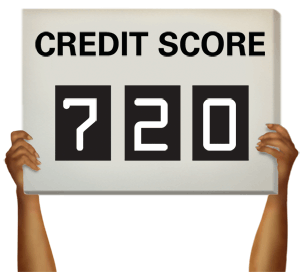How Are Credit Scores Calculated?
 Credit scores generally range from the 400s to an 850. Someone is considered to have excellent credit if their score is over 750, but anything over 720 still falls into the realm of respectable. But, how exactly are these scores determined? The first thing you need to know about how your credit scorer is determined is that the 3 major credit bureaus which generate your credit reports, Equifax, Transunion, and Experian will never release the exact formulations they use to generate your credit scores. This is for the same reason that McDonald’s will never give out the exact recipe to the Big Mac. Sure, they’ll tell you the ingredients. But, they’ll never tell you how much of which ingredient was used, or how it was actually prepared.
Credit scores generally range from the 400s to an 850. Someone is considered to have excellent credit if their score is over 750, but anything over 720 still falls into the realm of respectable. But, how exactly are these scores determined? The first thing you need to know about how your credit scorer is determined is that the 3 major credit bureaus which generate your credit reports, Equifax, Transunion, and Experian will never release the exact formulations they use to generate your credit scores. This is for the same reason that McDonald’s will never give out the exact recipe to the Big Mac. Sure, they’ll tell you the ingredients. But, they’ll never tell you how much of which ingredient was used, or how it was actually prepared.
Despite the fact that it is next to impossible to find out exactly how your credit score was generated, there is a significant amount of information we do know about how your credit score is generated. Here we will take a look at what is known about the generation of FICO scores.
Payment History – 35%
There is a good reason why people panic over late payments on their credit report. Your payment history factors to 35% of your credit score – so one late payment can have a large impact. It should be remembered, however, that the overall picture of your credit could mitigate a late payment or two. There is consistently a minority of people whose reports show a few lates but their credit scores have remained above 720.
Amounts Owed – 30%
Your credit score is positively affected by your having multiple accounts, but not owing a significant percent of the credit limit (high balance) on them. In other words, if you have a card with a $10,000 limit you are golden if you owe under $5,000. If you owe $9,892, it may affect your credit report negatively – especially if all your cards are maxed out or near the limit.
The Length of Time You Have Had Credit – 15%
For those who are recently beginning their credit profiles, whether it be because they are teenagers, immigrants to the country, or for another reason, it is almost impossible to have a very high credit score. You have to start from somewhere, and it takes time to establish your credit history.
Type of Credit – 10%
It is a good idea to have several different kinds of credit accounts open. Different kinds of credit accounts include student loans, credit cards, car (or other vehicle) loans, mortgages, and installment loans.
New Credit Accounts – 10%
According to the credit bureaus, those who have opened new accounts too rapidly have historically been riskier borrowers than the average. Opening multiple new credit accounts in a short period of time could signal that you expect to be turned down – so you place numerous applications, or that you are not taking your credit seriously. It is a good idea to consider every credit application carefully. This is also the part of your credit which is affected by the credit inquiries, which occur when lenders take a look at your credit in order to determine your credit worthiness.


Latestpost
14
Jul
Factors That Can Help First-Time Borrowers Establish Credit
It is one thing to have bad credit in today’s wo ...

Download our
FREE GUIDE
and get weekly money-savings tips!
KnowledgeBase
Essentials




